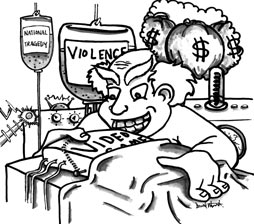
Video game makers thrive on the use of the shock factor to sell their games.
Some creators have even developed video games depicting tragic historical events in order to get publicity.
Such games include a JFK assassination game, a Columbine shooting game and the newest controversial game, New York Defender II.
The purpose of New York Defender II is to protect New York City from hijacked airplanes.
The advertisement for the game reads, “Don’t harm innocents, but watch the aircrafts carefully … Some are being hijacked! Tear hijacked aircrafts to pieces before they hit New York City.”
Those who cannot defend the New York skyline in a timely manner witness the hijacked airplanes slamming into well-known New York City landmarks, including the Brooklyn Bridge, Wall Street, the Empire State Building, the Statue of Liberty and the United Nations.
All the violence and gore come complete with realistic graphics and sound effects, including sounds of roaring jets, bullets and explosions.
The exploitation of the tragic events of Sept. 11 is sick and distasteful.
Certainly, someone should have realized how offensive such a game would be to the many directly affected by the attacks.
And anyone who considers themselves an American should be offended.
It is unfortunate what lengths video game makers will go to in order to make a few extra bucks.
On the Internet, one can also find an extremely disturbing Web site—a Columbine shooting game where players choose a gunman to shoot up the school, reenacting one of the deadliest school shootings in American history.
The game includes actual images and sounds from that day, including pictures of gunmen Eric Harris and Dylan Klebold dead on the floor after their suicides. Some images used in the game were taken from the school’s security cameras, including images of the cafeteria as students were being murdered.
The game creator has stated time after time that his intentions for creating the game were good, but he continues to receive criticism from the families affected by the shooting.
Posting violence on the Internet and allowing it to go unpunished is the same as condoning the video games.
These games reopen old wounds in the lives of those who were directly and indirectly affected by the tragic events in addition to highlighting death and destruction as selling points of the game.
It is impossible to eliminate every violent video game from store shelves and the Internet, but games such as New York Defender II and the Columbine Massacre game are, despite bad publicity, still accessible to the masses over the Internet.
The public should show its revulsion of such games by refusing to visit these sites.


























